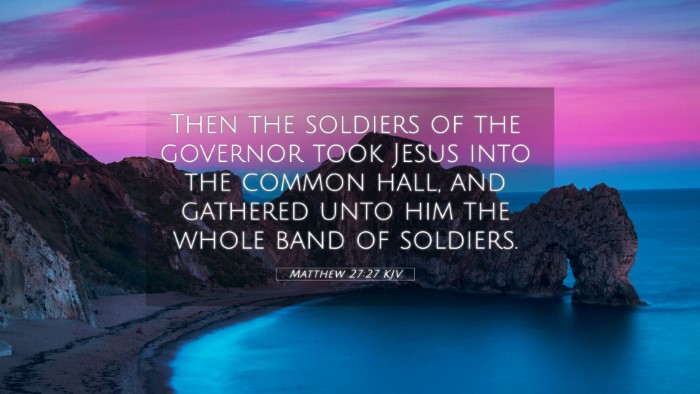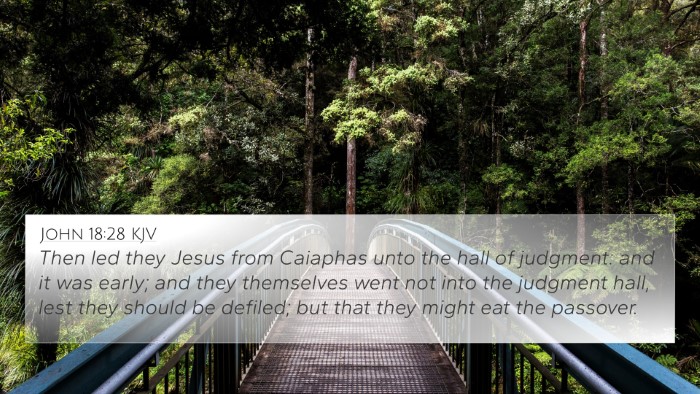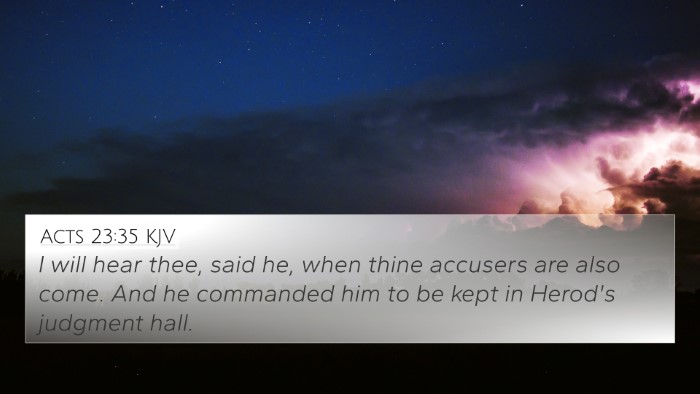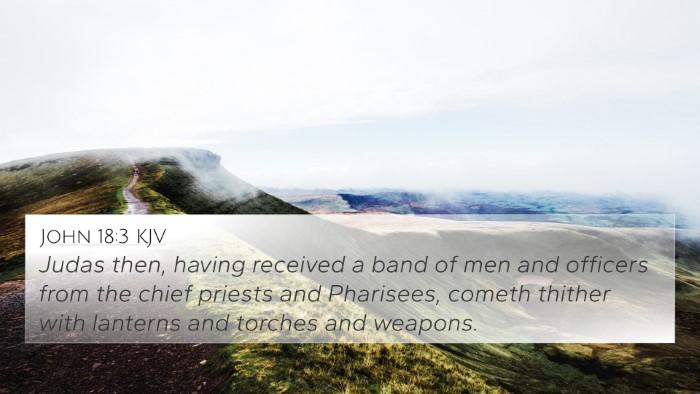Understanding Matthew 27:27
Matthew 27:27 serves as a poignant moment in the Gospel narrative, encapsulating the humiliation of Jesus Christ prior to His crucifixion. The verse states, "Then the soldiers of the governor took Jesus into the governor's headquarters, and they gathered the whole battalion before him." This passage is pivotal in illustrating the profound depth of mockery and disdain faced by Jesus during His passion.
Interpretation and Insights from Commentaries
The commentaries of Matthew Henry, Albert Barnes, and Adam Clarke reveal various layers of meaning within this verse, shedding light on its significance within the broader context of Scripture.
-
Matthew Henry's Commentary:
Henry emphasizes the cruelty and arrogance of the Roman soldiers. They not only took Jesus from trial to trial but also subjected Him to ridicule and scorn. Henry observes that gathering a battalion demonstrates not just a display of military might but illustrates the collective mockery that Jesus endured as part of the fulfillment of prophecy.
-
Albert Barnes' Notes:
Barnes interprets this gathering of soldiers as a deliberate act designed to intensify the suffering of Jesus. By parading Him before a full battalion, they mocked His claim to kingship. Barnes suggests this moment highlights the juxtaposition between worldly power and spiritual authority, emphasizing that Jesus' true kingship transcends earthly dominion.
-
Adam Clarke's Commentary:
Clarke focuses on the implications of the soldiers’ actions in the context of their authority and the unjust treatment of Jesus. He asserts that the act of uniting a battalion reflects the extent to which earthly powers conspired against the innocent. Clarke’s exposition draws connections between this disgrace and the suffering servant motif prevalent in the Old Testament, suggesting deep inter-biblical dialogues.
Biblical Cross References
To deepen our understanding of this verse and its implications, several related Scriptures can be examined:
-
Isaiah 53:3: Highlights the suffering servant, "He was despised and rejected by men."
-
Philippians 2:7-8: Reflects on Jesus taking the form of a servant and humbling Himself.
-
Luke 22:63: Describes the mocking Jesus faced during His trials.
-
John 19:1: Further details the scourging and mocking that Jesus endured.
-
Psalm 22:7-8: Prophetic words that communicate the scorn directed at Jesus.
-
Matthew 26:67: Describes the physical abuse and spitting on Jesus.
-
Mark 15:17: Mentions the soldiers dressing Jesus in a purple robe, mocking Him as a king.
-
Romans 5:8: Underlines God’s love in Christ's sacrificial suffering.
-
Luke 23:11: Addresses Herod's soldiers mocking Jesus, confirming the widespread derision.
-
1 Peter 2:23: Encourages believers to observe how Jesus responded to mockery and abuse.
Connections Between Bible Verses
Exploring Matthew 27:27 offers valuable insights into the cross-references and themes prevalent throughout the Bible, especially regarding the suffering servant and the ridicule faced by Jesus.
-
Thematic Bible Verse Connections: The act of mockery in Matthew 27 can be compared to the ridicule directed at figures such as David in Psalm 22, or at Joseph by his brothers, demonstrating a recurring theme of unjust suffering.
-
Comparative Bible Verse Analysis: The connection between Matthew and Old Testament prophecies, especially Isaiah, illustrates the fulfillment of messianic expectations amidst humiliation.
-
Scriptural Cross-Referencing: By linking Matthew 27:27 with verses like Philippians 2:7-8, one can appreciate the profound humiliation Jesus endured as part of His redemptive mission.
Tools for Bible Cross-Referencing
To further enhance your study of Bible verses and their interconnections, consider utilizing various tools and methods:
- Bible concordance to locate keywords and phrases.
- Bible cross-reference guides that illuminate connections between scriptures.
- Digital resources offering comprehensive Bible cross-references for easy navigation.
- Cross-reference Bible study formats that encourage thematic exploration.
Conclusion
Matthew 27:27 is more than a historical account; it invites readers into a deeper understanding of Jesus' sacrifice and the fulfillment of prophecy. The interwoven connections between various Biblical passages reveal a rich tapestry of themes emphasizing suffering, redemption, and the nature of true kingship. By embarking on a journey through the Bible's cross-references, one uncovers the profound truth woven into each verse, showcasing the inter-biblical dialogue that shapes Christian faith.










